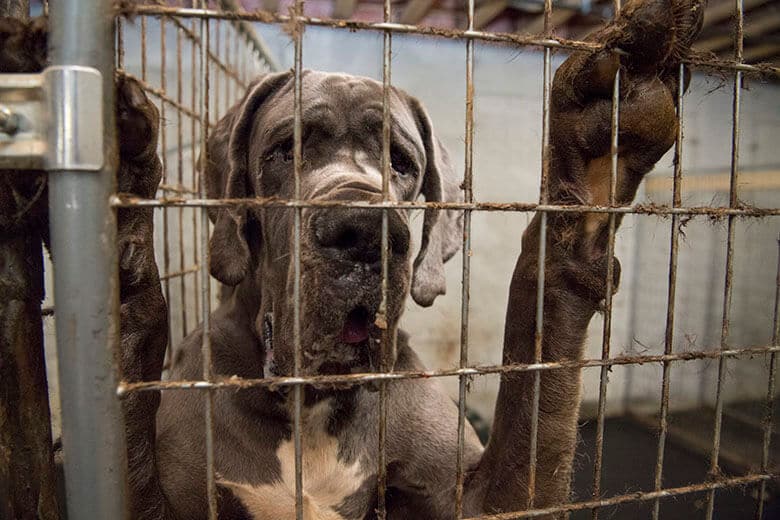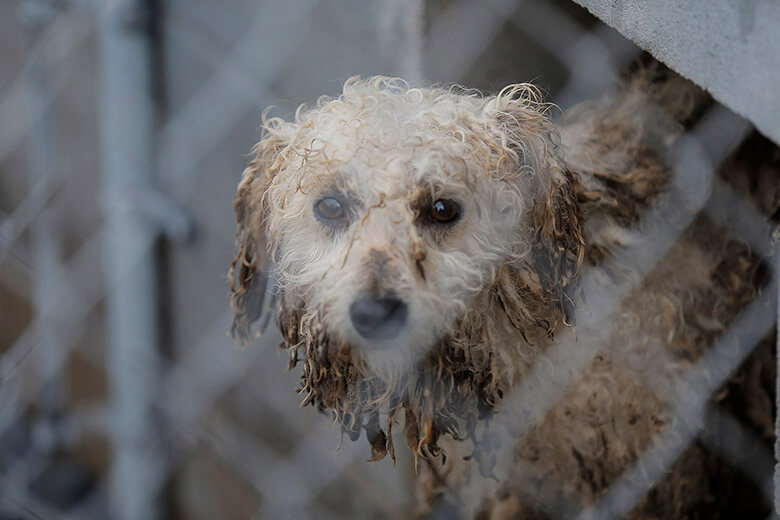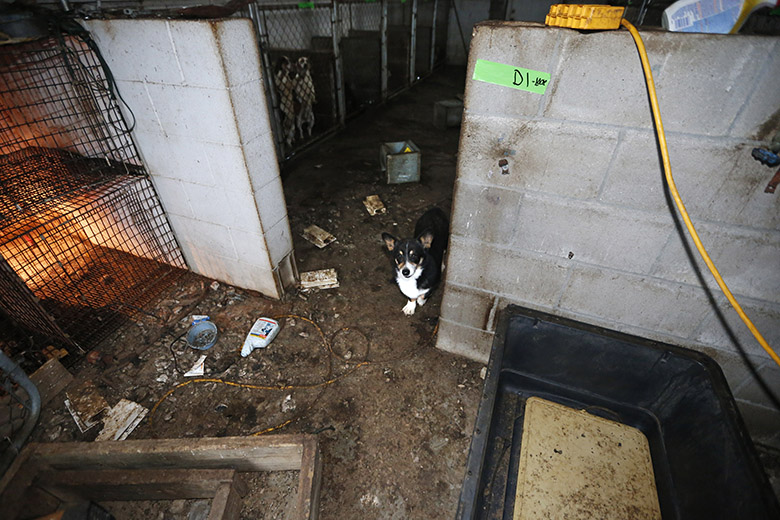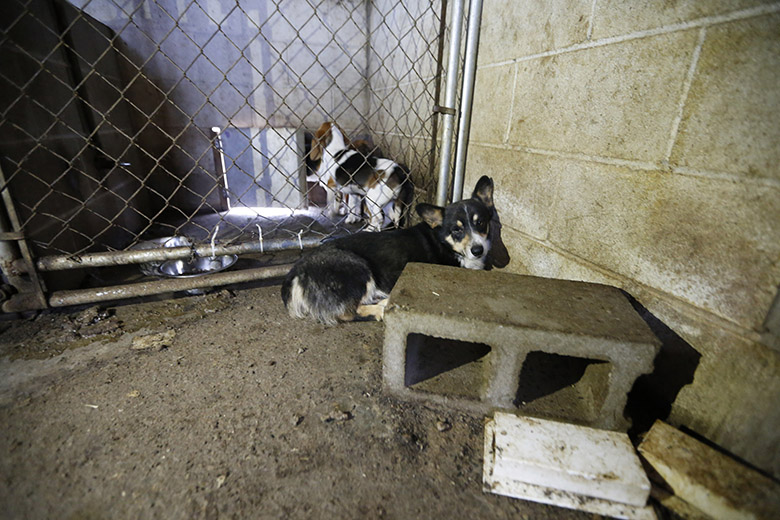In early February 2017, This Dog’s Life reported that the USDA purged all animal welfare records from its website. This database allowed the public to view the information and any violations in puppy mills, zoos, circuses and research labs. Without public access, there was no way to keep tabs on the enforcement of the federal Animal Welfare Act and protect animals from the suffering and abuse animals face at these facilities.
The blackout happened without notice or much of an explanation, except stating that it was removed “based on our commitment to being transparent, remaining responsive to our stakeholders’ informational needs, and maintaining the privacy rights of individuals.”
The animal welfare community responded with outrage, criticism and pressure. This week the USDA announced “the rollout of the refined public search tool that provides access to Animal Welfare Act compliance records.”
But the database has been deemed “useless” by The Humane Society of the United States and other animal welfare organizations. While details on specific violations have been restored, the majority of these have not been linked to the identities of any of the violators.
“It’s rather absurd to post a list of licensees on one part of the USDA website, and a list of violations on another part, while deliberately failing to link the two,” Kathleen Summers, the director of outreach and research for puppy mills campaign at HSUS told This Dog’s Life. “So, one can look up a commercial breeder to see if the person is licensed, but they still have no way of knowing if that licensee is complying with the Animal Welfare Act or has received warnings for failing to take proper care of their animals.”
Related: The ‘Horrible Hundred’ Report Released to Shine Light on Worst Puppy Mills
For example, puppy mill violation reports list violations, but the names and locations of the breeders has been blacked out. This information was vital in educating the public about the inhumane conditions common at most USDA-licenses puppy mills and for passing and enforcing laws that protect the lives of the breeding dogs. The only exception is for certain businesses, primarily middleman “brokers,” that do not have a residence on the business property. But the vast majority of puppy mills have some kind of personal residence on the same property, says Summers.
“The USDA has indicated that this review is part of an effort to ‘balance its commitment to transparency with applicable laws including rules protecting personal privacy,’” says Gina Moraz, manager of the ASPCA’s Puppy Mill Campaign, “but by continuing to hold back much of the previously available information, the USDA has chosen to protect commercial dog breeders, many of whom raise dogs in deplorable conditions, instead of protecting the thousands of dogs that languish in these facilities.”
Back in February, the Animal Legal Defense Fund sued the USDA for removing the records, citing “the USDA’s decision to remove the records violates both the Freedom of Information Act (FOIA) and the Administrative Procedure Act (APA).”
This week, a federal district court judge threw out that lawsuit. Judge William Orrick said that while courts could order the release of documents under the Freedom of Information Act, they can’t “mandate publication to the public as a whole,” according the The Hill.
Summers notes that the pet industry has been pressuring the USDA for a long time. “Commercial pet breeders were angry about being called out as puppy mills when the egregious animal welfare violations of many violators became public,” she says. “Yet, instead of addressing the problem by working to weed out the bad apples in their industry and protect the health and welfare of dogs, the pet industry lobbied to have the information on their violations covered up instead.”
Related: New York City Puppy Store Under Fire After Video Shows Alleged Abuse and Neglect of Dogs
The problem is serious, as the USDA is the sole federal agency responsible for the licensing and inspection of commercial dog breeders and pet dealers. “Their responsibilities to enforce the Animal Welfare Act (AWA) remain, but by shielding this information from public view, it is impossible to know if USDA is doing their job,” says Moraz. (Here is a before and after of a report.)
That makes it impossible for any organization to take action against the USDA, says Elizabeth Oreck, the national manager for puppy mill initiatives at Best Friends Animal Society. “Without access to this information, anyone who purchases a puppy from a pet store should be very concerned that neither the store nor the customer has any real way of knowing if the breeder that supplied that puppy has been cited for serious animal cruelty violations.
The USDA responded by telling This Dog’s Life, “The updated public search tool allows members of the public to search for inspection reports by license/registration type and/or state,” says Richard Andre Bell, the public affairs specialist. “Additional search options and information may be available for certain business entities, such as the names and addresses of corporations with commercial addresses.”
The HSUS reports that legislation is being introduced that will mandate the information be fully restored. “Animal protection is a nonpartisan issue,” says Summers. “We urge animal lovers to continue to ask their lawmakers to press for full transparency and accountability to be restored.”
Related: More Than 80 Great Danes Rescued from ‘Puppy Mill Mansion’
What can you do? The Humane Society recommends asking your lawmakers to co-sponsor the Animal Welfare Accountability and Transparency Act (H.R. 1368/S. 503). This will require the USDA/APHIS to keep and make publicly available online searchable information about breeders and facilities that violate the Animal Welfare Act or the Horse Protection Act, and prevent them from claiming an accelerated depreciation tax benefit for five years.
While Best Friends Animal Society encourages people to adopt from shelters. “The most effective thing that consumers can do is to choose not to support puppy mills,” says Oreck. “There are so many wonderful dogs and cats of all sizes, breeds, ages and temperaments looking for homes in shelters and rescue groups across the country.”
The ASPCA also has an initiative to end puppy mills, called the ASPCAAdvocacy Brigade.
“Anyone who believes those who hurt dogs should not be permitted to profit from their suffering should be concerned by USDA’s action,” says Moraz. “The fact that the government is hiding basic information, like how many animals a breeder has, or whether they violated the AWA, should be a red flag that many of the conditions at these facilities would be unacceptable to the public.”
Related: California Is One Step Closer to Becoming First State to Ban Puppy Mills






















